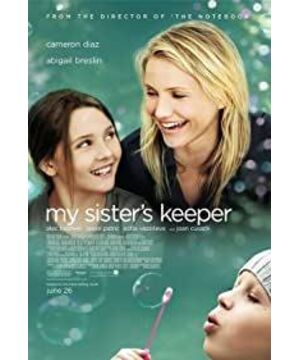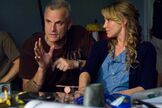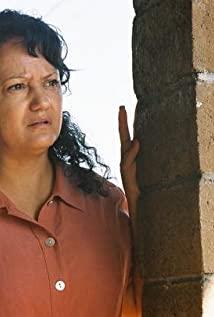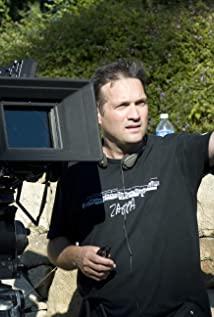Teacher Zhu Medical Anthropology Course Film Critic Homework
Since it is not possible to form a comprehensive structure when watching the movie, this article will start with the analysis of the three characters Anna, Kate, and Sara.
1. Anna: The birth of technology and the struggle for body autonomy
The film begins with Anna's understanding of her own "birth", she said: "Most babies are coincidence, souls flying around, looking for bodies to live in, then down on Earth. Mom told me I am a little piece of blue sky and I come to this world because dad and mom love me so much. It was only later that I realize it wasn't." Her imagination of "born in the world" is from the beautiful blue sky or heaven ("blue sky" or "heaven ") The soul that has descended on the world, in the mother's words, her birth is undoubtedly the "crystallization of love" of her parents, but her life experience tells her that it is not the case. In her understanding, the birth of many children is nothing more than accident ("coincidence"), but her own production has a special purpose ("for particular reason")-she uses IVF technology with a "100% success rate" The designer baby successfully synthesized has become Kate's "perfect chromosomal match", whose function is to continuously provide various organs of the same genotype for the leukemia sister.
The role of IVF technology in Anna's birth is crucial. In fact, the birth of this child was not entirely based on the subjective wishes of his parents -when they were desperate due to Kate's deteriorating condition, if Kate's long-term attending physician Dr. Chance hadn't suggested (suggest) Sara & Brian to consider giving birth. A child with the same genotype as Kate, they probably will not have such an idea, and it is very likely that Anna will not be born. It is worth noting that although Dr. Chance showed a very cautious attitude when proposing "test-tube baby as a possible choice", he also admitted: "It's not for everybody." [1] and stated that the wishes of the family are the first- - but he promised to "as a technology test-tube baby," the success rate is confident and made no doubt : he promised "100% match" to Sara & Brian. In fact, faced with Kate’s critical life situation, the options available to family members are extremely limited, and they often have to submit to or actively submit to (subject to) [2] The science represented by the doctor authority. In this sense, it is the IVF technology as the most convincing power in the hands of Dr. Chance to guide Sara & Brian's choice-the birth and birth of Anna. Not only that, this kind of technical success is constantly being self-verified among colleagues to strengthen the legitimacy of "doing this" : one of the few doctors summoned at the hearing is the consensus: "Kate is a miracle", and when asked about the meaning of Anna (for all the donations made by Kate)? The answer from the doctors was: "She got to save her sister's life!" The source of the miracle, or where did the birth of Anna come from? The answer speaks for itself. What a self-praise for the miracle of man.
It can be said that Anna has lost autonomy over her body since she was born. She was conceived by Sara to serve as Kate's organ bank reserve. During Anna’s childhood, Sara would always lure her into the operating room in the name of "helping her sister" (sometimes by taking her to eat ice cream), although Anna had shown that she was very sensitive to medical behaviors such as needle sticking on the operating table (bone marrow). Puncture), but her too young body can always be easily controlled by the doctor as the executor. Before Kate's condition deteriorated to the point where he needed a kidney to be taken, the cells and blood removed from Anna could be regenerated. If we consider the sustainable regeneration of body organs as a kind of bio-capital that can achieve mobility through transplantation, etc., the regeneration of the organs will also have value (value), saying that Sara uses the veil of family affection to exploit Anna. Not an exaggeration: At a very low cost [3], when Anna did not have the ability to think and act independently, she possessed a bio-capital that did not belong to Sara, but should be exclusive to Anna's property- even though it was for rescue. Kate's purpose.
The eruption of contradictions is inevitable. The key lies in the struggle for medical custody. The core of Anna’s appeal is to get back the right to dominate her own body ("rights to my own body...not want to have something cut out of me"). The reason for this comes from the capitalist social and cultural presupposition that "the body should belong to one's own disposable property"; on the other hand, it cannot be ignored that Anna, who has entered puberty, is influenced by her peers, and when the surrounding partners talk about it Each yearning for the lifestyle, Anna will also look forward to unfettered playing football, being a cheerleader, and even future pregnancy, entering old age (and thus living a long time) and other life processes- without a doubt, a healthy, and A body that is not mutilated is an indispensable carrier for Anna to realize the ideal state of free life mentioned above . Therefore, she does not want to live a cautious life in the future because of the donation of a kidney ("but I don't want to be careful. Who wants to live like that?”). The emergence of a sense of physical deprivation made Anna turn to the famous lawyer Alexander for help. However, he agreed to become Anna's voice and legal agent. His support is not entirely accidental luck. Alexander is deeply suffering from epilepsy. Knowing how helpless and painful it is to not gain control over body-this is the inevitable consensus that they can form an alliance . They will initiate a struggle accordingly.
2. Kate: Obvious morbidity and constant resistance
Kate's leukemia is not the only morbid condition among the three children, but the abnormal measurement of blood indicators under the quantitative standard made her "unwillingly" take a lot of attention and care that should belong to Jesse from her parents. In contrast, Jesse’s dyslexia is difficult to show in a quantitative way, like the white blood cell content per unit of blood to convince parents-Sara & Brian needs to invest a lot of time and brainpower to understand the son’s face (it is considered by the public to be ) Difficulties in simple reading tasks, otherwise the disorder encountered by Jesse may cause deliberate reciprocal misunderstanding... For Kate, the changes brought by leukemia and its treatment to her body are very obvious. She didn’t want to get up after chemotherapy, she thought: "I'm too sick. I'm too tired. I'm too ugly. Don't you dare tell me that I'm beautiful because I'm not. Don' t you dare tell me that nobody's staring at me. I'm a freak!" The face without hair is ugly. Going out means facing the eyes of others evaluating women’s looks, and is mixed with postoperative physical and mental fatigue. , Which constitutes the pathological state of her self-recognition; when she first met Taylor, when asked "what do you do when you are not in the hospital", Kate's answer was: "I just waited (physical condition) and then returned to the hospital." She In this way, his morbid state is constructed in the constant sense of instability.
But Kate's resistance to this has never stopped, and the struggle for body autonomy is her main battlefield. When she was just hospitalized, Kate did not adapt to this unfamiliar place very much. Faced with the old lady's admonition, her response was to talk back with Anna and spoof urine samples by dropping the bag, in front of the surprised old lady. Performing oneself can unscrupulously drink and squirt one's own "urine" to demonstrate the control of one's own body (and its extension), thus trying to regain the subjectivity of one's own body in the hospital. The other time was the prom night after meeting Taylor-this was undoubtedly one of the happiest times in Kate's life. Although she still needs to rent a wig to show Taylor and everyone present her (thought) the most beautiful body, when she took off the wig and met Taylor frankly on the hospital bed, she said sincerely: "Glad I'm sick".
With regard to death, Taylor and Kate were both frank and undaunted. For Kate, treatment is no longer a pain, "Whole life is a pain", she doesn't want to live in pain anymore, she just wants to end here, "It just gets scarier from here on out". Otherwise, lingering and prolonging life means that she will be stubbornly insisted by her persistent mother to continue the painful treatment, chopped up like an experimental sample (of Sara's), until only the last two cells remain ("Mom's gonna chop me and cut me till I'm a vegetable. Two cells in a petri dish that she shocks with an electric cord”), therefore, facing death directly, rather than letting disease be ravaged by disease, can also be understood as Her last rebellion against morbidity. Kate’s death-death attitude that Jesse blurted out was the decisive factor in driving the judge’s decision. Kate in the movie finally got her wish: she fulfilled her last wish to go to the beach-this value of enjoying life until the last moment and dying in peace (value) Also got the support of his father [4] . In Anna’s imagination of Kate’s death, “She’s gone, a little piece of blue sky.” She returned to the sky—the place where she was born, and was happier than the world (in Kate’s cognition, She will reunite with Taylor wherever she goes after death). Kate’s death also made Anna reconcile with herself. Anna initially believed that the meaning of her birth was to become Kate’s genetic savior, but the life she experienced with Kate told Anna: her birth should never be regarded as, or regarded as for god's/savior's sake, salvation is not important-in fact, it is impossible and impossible to achieve-what really matters is the relationship she and her sister shared(Relationship). "The point is, I had a sister. She was fantastic."
3. Sara: The guardian angel? Guardian of surveillance?
Sara’s key motivation in the whole film revolves around control. She regards her two daughters as an extension of her mother, and tries her best to use medical technology and scientific authority to achieve the impossible transgression from "human" to "god"—— Of course, the tragic ending still needs to be borne by the specific "person".
Sara's control over Anna mainly lies in the control over property of body and organ. There is no doubt that she has regarded the body of her youngest daughter as a continuation of her body since Anna was born, so that she can control and possess various organs in her body unscrupulously. Until Anna resisted in legal form, Sara still believed that Anna was just a "child whose mind changed every five minutes." Control of the body. However, for the two questions of "Can children have the right to self-determination over their own bodies?" and "When can children have the right to self-determination over their bodies?" There was constant arguing about this ("But also said I was too young to understand the situation fully and none of them would say at what age I'd be able to understand. All in all, they were like me, pretty confused."). However, Sara obviously ignores the possibility of such a dispute and monopolizes Anna's physical control.
The warm scenes in the family album (cut-and-clip pop-up book) run through the whole film-this is Kate's most valued item. Before she died, she showed Sara her mother's imagination: "A guardian angel who watches over me every single day no matter how sick I am. I know I am never alone.” There can be a double interpretation of this sentence , and it is more in line with the film situation: Kate expresses his meticulous care for his mother before his death and the care that he will never leave. His gratitude, thanks to his mother’s companionship, so that he will not face the illness alone— but considering Kate’s knowledge that time is running out, acceptance of death, and Sara’s insistence on surgical treatment, the above evaluation may also be the case. It can be understood as: my mother is a "guardian angel" who monitors her health day and night, no matter how bad my condition is (no matter how bad I don't want to live in this world), she (will never consider me Thoughts, but to implement her own will) will insist on letting me be treated. I know (due to my mother's control) that I can never go to death alone.
Sara's control over Kate is mainly in the survival and death of life (control over life and death). She insisted on the former from beginning to end, and tried every means to continue Kate's life. In order to achieve this, she arbitrarily decided and spoke about the continuation of Kate's life and death. In fact, she couldn’t listen to Kate’s desire for death and the corresponding expression-although Brian & Jesse both said that Kate had actually expressed his desire to die with Sara many times after receiving the court’s At the time of the accusation, the unbelievable Sara completely ignored Kate who wanted to explain this on the side of the hospital bed, but just slapped Anna, who was equally excited; after Kate was hospitalized in chemotherapy, she did not care much about Kate’s gossip content, which happened in Kate. When vomiting, the mother's reaction and care are far less timely than Taylor. In fact, she doesn’t even recognize that death is a normal process of life, and doesn’t care what kind of life experience her daughter really wants (to live in pain or die with peace of mind)—she just blindly emphasized: "We are doing The operation." This decisive attitude may be related to her original lawyer career: in the dialogue with Kelly, she said that she never accepts failure. In the middle, she recognized the former and would never admit defeat.
In order to win her victory over death, she chose to have complete trust in advanced medical technology : Brian still had concerns when Dr. Chance made the IVF suggestion, but Sara accepted it almost without hesitation. She is not reconciled to the physical defects caused by the accidental nature of life. Once she discovers the technical possibility of redesigning life, she will inevitably choose to try—and this leapfrog is often considered in the traditional Western cognition: only "God" is qualified, and With the ability to realize it, Sara, as a “person” who wants to overstep the finiteness of life (inevitable death), will only end up with a portrayed image of an insane hysteric woman (insane hysteric woman). All the pains encountered will eventually be borne by her specific "person". It seems that Sara, as a “human”, will inevitably fail to overstep the “god” who has the ability to resist death, but is it really that simple? The real behind-the-scenes doctors—the doctors who developed technology and persuaded patients and their families to make medical attempts—thought about him—in Anna’s on-site recount, the doctors summoned in the court said: “Nothing was their fault and it was a complex problem." Power is often hidden behind the scenes in an invisible face.
The sharp counterpart to Sara is Brian. His father had predicted the tragic result from the moment the IVF decision was made : "It was our fault. We can't against nature and this was our comeuppance." Transcending nature and seizing the power to design life, from that moment, determines the future retribution. But he has always been weak. In the past ten years, he has been obedient to his wife's decision. It was not until Kate wanted to see the beach before he died that he bravely resisted for the first time. However, it was too late. Tiny bubbles that were once flying all over the sky echoed his understanding of the nature of the family’s living conditions: "But beneath the exterior fine, there are cracks, resentments, alliances that threaten the very foundation of our lives as at any moment our whole world would come tumbling down."
[1] The implication: Not all families have the same material conditions as their homes to try IVF technology to save their children. This actually implies healthy class inequality, but there are other related things in this film. There is less material, so I won’t expand it here
[2] This is indeed the choice they made, but Sara and Brian’s attitudes are very different, which will be discussed in detail in the third part.
[3] It may only pay the cost of raising Anna’s daily life, but it is obviously far below the market price that rare organs may reach
[4] The conflict between Sara and Brian will start in the third part
View more about My Sister's Keeper reviews











